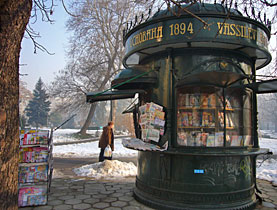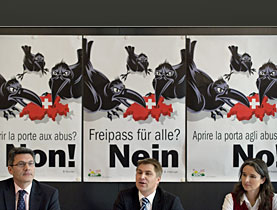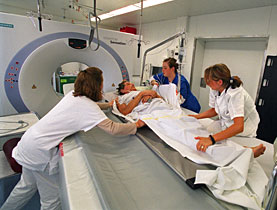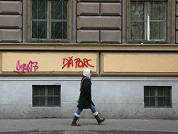Will tough times drive Romanians out?

With the financial crisis taking a hold across Europe, politicians in the continent's emerging east worry about social unrest as unemployment rises and government budgets fall.
While some young Romanians may be tempted to seek work elsewhere, on a visit to Romania swissinfo found little indication that they were keen to leave their country in droves.
In late January, Romania’s centre-left government of Prime Minister Emil Boc’s approved a budget to ease the country’s deficit from five per cent of Gross Domestic Product (GDP) in 2008, to two per cent.
Economic growth this year is anticipated to be half the eight per cent rate of the past three years, state revenues are expected to fall and Boc is weighing his options for a bailout from sources including the European Union and the International Monetary Fund (IMF).
Unlike in southern neighbour Bulgaria, the situation in Romania has failed to precipitate popular unrest, and most ordinary people seem unlikely candidates to become economic refugees even if things get worse.
Romanians have been eligible to move throughout the rest of Europe since the country joined ranks with the EU just over two years ago. They could also soon come to Switzerland if voters there approve extending a labour accord in a vote this Sunday.
Unskilled workers, many of whom had settled in Spain and Italy, are moving back as shrinking foreign economies lower their prospects for work. Others were unwilling to take the risk of leaving in the first place.
“They have a house, a job and a car,” says Paul, a taxi driver waiting for passengers outside Bucharest’s Henri Coanda airport. “They cannot risk everything to follow the stars. If you have a minimum, you don’t go.”
He says taxi drivers have experienced many positive changes over the past decade and he balances the allure of life in a richer country with realism.
Black market
“You need a specialisation if you want to go to Switzerland and be successful,” he said. “It’s not like in Italy where you can work in agriculture.”
He speaks candidly but as the conversation moves to a more controversial subject, he asks for anonymity.
“It’s everywhere,” Paul says of the country’s black market, minutes after negotiating what turned out to be an exorbitant fee for a short ride. He had offered to charge one amount, write a receipt for a second amount and split the difference.
The official GDP per capita, according to the IMF, is $9,953 (SFr11,540), and incomes are among the lowest in the EU. But Paul believes that in the midst of a global financial mess, his bases are covered.
“How can it affect me?” he asks. “I have on my balcony some potatoes, some cabbage for the winter. I don’t play on the stock market. It doesn’t affect me so much.”
The taxi driver is loosely aware of a debate in Switzerland about gradually opening the labour market for Romanians and Bulgarians. But Switzerland’s size makes it relatively inconsequential.
Outward looking
“They don’t really talk a lot about it here,” says Mādālina Nicola, a 20-year-old university student studying European politics.
She has been paying attention to what has been happening in Switzerland as rightwing parties seek to defend the country against what they perceive as a threat from outside.
From her part-time post at a trendy Bucharest bookshop, she sees a country looking outward but secure in its identity.
“I’ve seen many people buying books about different cultures and about history,” she told swissinfo. She says she wants to move out of Bucharest but not out of Romania.
“I have a lot of things to discover here.”
High-tech
Timişoara may as well be called “Little Silicon Valley”. Outside Bucharest, it is the place where European and North American software firms farm out much of their programming. It’s also home to top-notch hackers.
Like most of the world’s great cities, it also has an Irish pub. But there are Irish people too – managers from a Dublin-based firm that makes transistors for next-generation mobile phones.
Companies operating within Romania snap up some 75 per cent of engineering students after they graduate; they come because the talent is good – and because it still costs less to keep employees here than in western Europe.
Mircea, a hardware engineer who plans not to move abroad, believes Romania’s insularity is in part a massive national self-defence mechanism.
He says on both sides of the country, people are acutely aware of its mediocre reputation in the rest of Europe. Most blame the gypsies but also place blame on themselves – the country as a whole has done little to stem negative perceptions, they believe.
In the smoky pub, Mircea shuttles between a spot held by his Irish friends and another, where a 26-year-old programmer named Walter nurses a beer. Walter speaks fluent English and a bit of German and has few complaints about Romania. But unlike Mircea, he is planning to do contract work abroad.
It’s nothing personal he says – domestic firms just don’t embrace the concept of short-term work periods, and he could make better money in London.
Walter plans to return but says his younger sister, a graduate psychology student at the prestigious University of Chicago in the United States, is unlikely to come back to Romania. She owes their parents $40,000 for a year’s tuition.
swissinfo, Justin Häne in Timişoara and Bucharest
Population: 22.3 million
Language: Romanian
GDP per capita: $12,698
Population: 7.7 million
Languages: German, French, Italian, Romansh
GDP per capita: $65,654
Romania is a country divided within itself and has an uncomfortable relationship with its gypsies to say the least.
Comprising roughly 10% of the population, the Roma people for many Europeans form the basis of Romania’s negative image.
Nearly every person swissinfo spoke to in Romania broached the subject of gypsies on their own.
“They are not Romanian,” one Swiss-based Romanian said, recounting an assault at the hands of a gypsy and a story of intimidation at a hospital.
Another said she was robbed. A third told of how gypsies drove residents out of a housing block through intimidation and boorish behaviour.
They are described by many as insular, immersed in crime and as having peculiar social habits.
In Switzerland, gypsies have a troubled history too. The Jenisch, which make up the majority of gypsies in Switzerland, total roughly 35,000. There are 100,000 in western Europe.
The Jenisch faced particular oppression from the local authorities in the 19th century. In 1850 it was decided that they should be forced to have Swiss citizenship.
For nearly 50 years in the last century, Jenisch children in Switzerland were removed from their parents and placed in foster homes.
The Romanian government has taken measures to integrate its own gypsy community but the group’s fiercely protective nomadic culture makes it difficult to imagine the majority will be assimilated any time soon.

In compliance with the JTI standards
More: SWI swissinfo.ch certified by the Journalism Trust Initiative





You can find an overview of ongoing debates with our journalists here . Please join us!
If you want to start a conversation about a topic raised in this article or want to report factual errors, email us at english@swissinfo.ch.